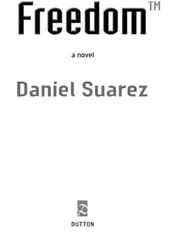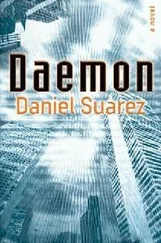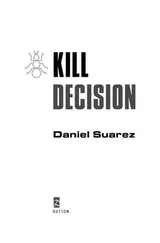“Yes. Actually it does.” Grady leaned back against the wall, feeling somewhat reassured. “If you’re a specialized intellect, what’s your specialization?”
“You. I was created to study you.”
That did not sound good.
“What do I call you?”
“Call me Jon.”
“I’m not calling you Jon. Jon is my name.”
“It’s our name.”
Grady contemplated his situation, trying hard not to be constantly aware of the sheaf of carbon needles stuck deep inside his brain.
“I will be completely forthright with you. I want you to know what our goal is and how our goal fits into the overall goal.”
“Whose goal?”
“I have no information on that.”
“Is this Hibernity prison? Is that where I am?”
“I am not familiar with this term.”
“Where am I?”
“I’d like to begin by describing what’s expected of you. My purpose is to analyze how your brain functions creatively under various stimuli. In order to obtain this data, I will need your cooperation as I ask you to conceive of certain ideas and perform certain tasks. Do you understand?”
“And if I don’t cooperate?”
“I’m hoping you will cooperate because I won’t be able to obtain this data without your assistance.”
“What if I don’t want you to have the data? What if I don’t want you to understand how I think creatively?”
“But I won’t be able to obtain this data without your assistance.”
“Yeah, I got that.”
“Are you willing to assist me?”
“No.”
“But I won’t be able to obtain this data without your assistance.”
“I got it the first time you said it.”
“Then are you willing to assist me?”
“Oh my God. Are you just going to continue—?”
“Are you willing to assist me?”
“No!”
“But I won’t be able to obtain this data without your assistance.”
Grady covered his ears and curled into a ball on the floor. “Shut up!”
“Are you willing to assist me?”
It continued like that for what seemed hours, the AI repeating its request, and no matter how Grady tried to muffle its voice, it was always right there in his head. He finally sat back up. “Stop! Enough already.”
“Are you willing to assist me?”
He sighed. “Yes.” If only to change the script…
“Good. I’d like you to imagine something for me.”
Grady tried to stifle his deep resentment. “What?”
“Imagine a situation where you take a long journey from your home in New Jersey. You begin by heading south for ten thousand kilometers.”
“All right.” He tried not to imagine it, but he couldn’t resist.
“Good. Now imagine that once you reach ten thousand kilometers, you turn ninety degrees and head due west for ten thousand kilometers.”
He imagined himself doing so but said nothing.
“Very good, Jon. Now imagine that once you traverse that distance, you turn ninety degrees back north, and walk another ten thousand kilometers.”
“Okay.”
“How far are you from your original location?”
Grady squinted at the ceiling as if it were a moron. “I’m back where I started.”
“Most people would not say that.”
“It’s non-Euclidian geometry—the Earth is a sphere. You can have three right angles in that triangle.”
Suddenly a projection of precisely that appeared on the far wall.

“You used several interesting areas of your brain to arrive at that conclusion, Jon.”
“So do I get a treat or something?”
“I’m given to understand that you have both color and number-form synesthesia. I have records on several human subjects with this mutation. What colors do you perceive when you hear these tones…?”
A Mozart piano concerto began to play in the room. Concerto no. 20 in D Minor, movement two. The beautiful music washed over him, and even he could feel his mind light up with the soundness of its structure. The beautiful waves of color. It was a very pleasant distraction from his current circumstances. After a few moments he could almost imagine the young Wolfgang’s thoughts as he formed his chords. Grady was unable to create such soulful music himself—but he could recognize the reason behind the notes. The structure of the sound.
“That’s very good.”
Grady opened his eyes—though he hadn’t realized he’d closed them—and looked back up at the ceiling, now rippling with waves of blue, gold, and indigo.
“Please concentrate on the music.”
“Go to hell.”
The music continued to play.
“Are you familiar with glia cells, Jon?”
He was not. “Go to hell.”
“For many decades it was believed that neurons were the chief motive power in the human brain. Glia cells, on the other hand, outnumber neurons ten to one, but unlike neurons they don’t react to electrical stimulation. So they were believed to be the structural glue that kept the brain together. The word glia is the Greek word for glue.”
“Leave me alone!” The music still played in all its beauty, and Grady kept trying to push his imagining of it down. To resist.
The voice of his AI warder continued, “Yet when we examined cross sections of Albert Einstein’s preserved brain tissue, we found no more neurons than the average person. However, we did find that Einstein had an abnormally high concentration of glia cells.”
Grady listened to the music, try as he might to resist. It caressed him with its rich color. With the beauty of its form.
“That’s a trait that you and Einstein share, Jon.”
Grady opened his eyes. That was indeed news to him.
“Glia cells are, in fact, a second brain within the brain—one centered not on electrical signals but on chemical ones. An analog computer to accompany the digital neurons.”
Grady could not resist visualizing quantum mechanical cells within his brain as the music flowed onward. As much as he wanted to tune out the AI’s words, it was starting to intrigue him. He had never heard of this chemical network in the human brain. But then he pulled back. This was insanity—why was he listening to this? “I don’t believe you.”
“There are several classes of glia cells. Radial, microglia, Schwann glia, and oligodendrocytes—all supporting the function, growth, and maintenance of neurons. But after the embryonic human brain completes its growth, radial glia transform into a new type of cell: astrocytes, named because of their resemblance to starlight. Their tendrils spread to connect hundreds of thousands of neural synapses. And they link with one another, building chemical networks—networks that also monitor neuron activity; in response to neural stimulation, astrocytes produce waves of charged calcium atoms, which result in a chain reaction, moving from cell to cell, causing messages to chemically propagate in the human brain. They can further stimulate specific neurons by producing glutamate, or suppress neurons by producing adenosine. These cells represent ninety percent of human brainpower, acting like an analog network, encoding information in slowly rising and falling waves of calcium. There is evidence, in fact, that they are a manifestation of consciousness and responsible for expressing creativity and imagination.”
Grady, while listening to the music, was also listening, as if against his will, to the AI. “When was this discovered?”
Читать дальше













